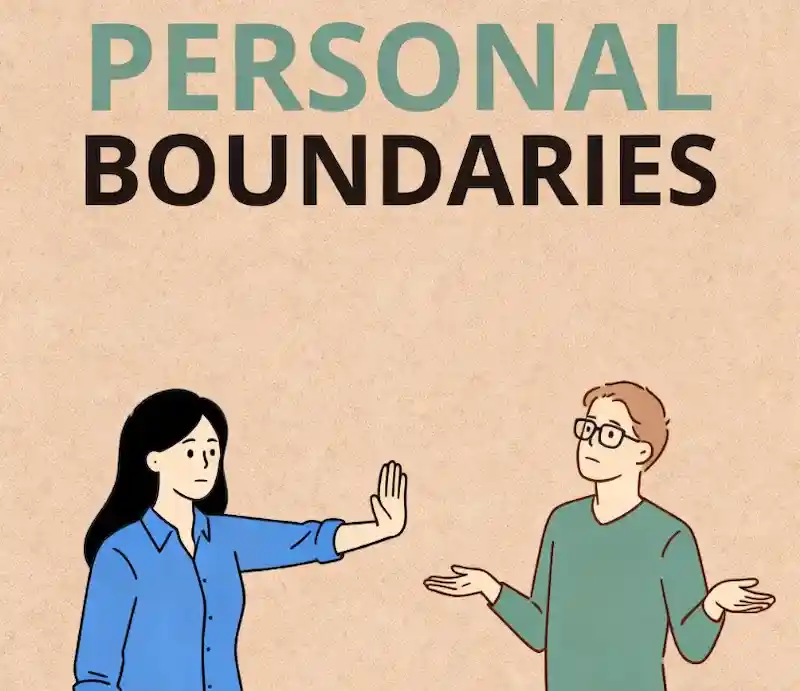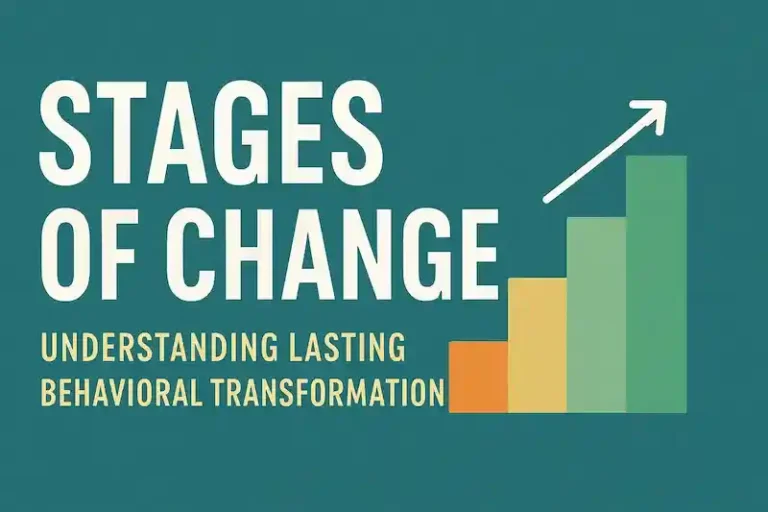Personal Boundaries: Why They Matter and How to Set Them for Healthier Relationships

Table of Contents
Introduction: Do You Struggle With Boundaries?
Think about your week: A coworker asked you to finish their report—even though you had your own deadline. A family member pressed you about your salary or relationship status at Sunday dinner. A friend borrowed your favorite jacket without asking, then returned it stained. If any of these sound familiar, you’re dealing with a common issue: poor personal boundaries.
Many Americans overlook the importance of boundaries, assuming they’re “rude” or “selfish.” But in reality, boundaries are the foundation of healthy relationships—with others and with yourself. They help you protect your time, emotions, and space while respecting those of the people around you. Let’s break down what personal boundaries are, why they matter, and how to build them.
1. What Are Personal Boundaries?
At its core, personal boundaries are the “rules” you set for yourself in relationships. They define what you’re comfortable with, what you’re not okay with, and how you expect others to treat you. Boundaries aren’t about pushing people away—they’re about creating clarity so everyone feels safe and respected.
Dr. Brené Brown, a renowned American researcher and author specializing in vulnerability and relationships, explains: “Boundaries are not about separation—they’re about connection. They let others know where you end and they begin.”
Personal boundaries cover four key areas:
- Physical boundaries: Your personal space (e.g., not wanting someone to stand too close in a grocery store), body autonomy (e.g., not liking unsolicited hugs), or personal belongings (e.g., not letting others borrow your laptop).
- Emotional boundaries: Protecting your feelings (e.g., not letting a friend’s constant negativity drain you) and not taking responsibility for others’ emotions (e.g., not feeling guilty if a coworker gets upset when you say “no”).
- Mental boundaries: Defending your thoughts, values, and beliefs (e.g., not arguing with a relative who mocks your political views) and avoiding oversharing (e.g., not telling a new acquaintance about your deepest insecurities).
- Time boundaries: Guarding your schedule (e.g., not staying late at work every night to help a colleague) and making time for yourself (e.g., saying “no” to a last-minute party so you can rest).
People with strong personal boundaries don’t apologize for their needs. They say “yes” when they want to, and “no” when they need to—without guilt.
2. Signs of Strong vs. Weak Personal Boundaries
How do you know if your boundaries are healthy? Let’s compare the behaviors of people with strong vs. weak boundaries across three key areas.
2.1 Verbal Communication
- Strong boundaries: You speak clearly about your needs. If a neighbor asks you to water their plants while they’re away—but you’re traveling too—you might say: “I wish I could help, but I’m leaving town that week. Have you tried asking Sarah next door?” You don’t overexplain or feel guilty.
- Weak boundaries: You avoid saying “no” to avoid conflict. Even if you’re busy, you might agree to water the plants, then resent the neighbor later. You might mumble or make excuses (“I’m kind of busy, but…”) instead of being direct.
2.2 Actions and Behavior
- Strong boundaries: You protect your space and time. For example, you keep your work phone on silent after 7 PM to avoid after-hours emails. If a friend drops by unannounced, you might say: “I’m glad to see you, but I’m in the middle of cooking—can we plan a time to hang out tomorrow?”
- Weak boundaries: You let others take over your schedule. You answer work calls at night, and you drop everything when a friend texts “want to hang?”—even if you had plans to relax. You might let a coworker use your desk supplies without asking, even if it annoys you.
2.3 Emotional Responses
- Strong boundaries: You separate your emotions from others’. If your sibling is upset about a breakup, you listen and offer support—but you don’t let their sadness make you feel guilty or stressed. You know their feelings are their responsibility, not yours.
- Weak boundaries: You absorb others’ emotions. If your sibling is sad, you might skip your gym session to comfort them, even if you needed the workout. You might feel anxious if a friend is mad at you—even if their anger is unfair.
3. Why Personal Boundaries Are Essential for Your Well-Being
You might think boundaries are “optional,” but research shows they’re critical for your mental health, relationships, and self-esteem. Here’s why personal boundaries matter.
3.1 Protect Your Mental Health
The American Psychological Association (APA) reports that people with clear boundaries have lower levels of stress, anxiety, and burnout. Why? Because boundaries prevent you from overextending yourself or letting others “dump” their problems on you.
For example: If a coworker keeps asking you to edit their work (on top of your own), saying “no” means you avoid staying late and feeling overwhelmed. Over time, this reduces chronic stress—which is linked to issues like high blood pressure and depression (per the Centers for Disease Control and Prevention, CDC).
Without boundaries, you might feel like you’re “losing yourself” to others’ needs. This can lead to resentment, low mood, and even physical illness.
3.2 Build Healthier, More Respectful Relationships
Boundaries don’t push people away—they create trust. When you set clear rules, others know what to expect, and they’re more likely to respect you.
Take family relationships: If your aunt keeps asking about your dating life (and you hate it), saying “I’d rather not talk about that right now” lets her know your limit. Over time, she’ll learn to respect your privacy—or you’ll realize she’s not someone who values your boundaries.
A 2022 study published in the Journal of Social and Personal Relationships found that couples with strong boundaries (e.g., respecting each other’s alone time) report higher satisfaction and less conflict than couples without them. The same applies to friendships, family, and work relationships.
3.3 Boost Your Self-Esteem
Setting personal boundaries is an act of self-respect. When you say “no” to things that hurt you, you’re sending yourself a message: “My needs matter.”
Over time, this builds confidence. For example: If you used to say “yes” to every favor (even when you didn’t want to), learning to say “no” will help you feel more in control of your life. You’ll stop feeling like a “people pleaser” and start feeling like someone who values their own time and emotions.
Psychologists at the University of California, Berkeley, note that self-esteem is closely tied to “self-efficacy”—the belief that you can control your life. Boundaries help you build that belief.
4. How to Set Healthy Personal Boundaries (Step-by-Step)
Setting boundaries isn’t always easy—especially if you’re used to putting others first. But with practice, it gets simpler. Follow these four steps to build strong personal boundaries that work for you.
4.1 Identify Your Boundaries (First, Know Your “Why”)
Before you can set boundaries, you need to know what they are. Start by asking yourself: When do I feel upset, drained, or disrespected? These moments are clues to your unmet boundaries.
Try this exercise (it takes 10 minutes):
- Grab a notebook and list areas of your life: work, family, friends, romantic relationships, and strangers.
- For each area, write down 1-2 things that make you uncomfortable. For example:
- Work: “My boss emails me after 8 PM and expects a reply.”
- Family: “My mom criticizes my cooking every time I visit.”
- Friends: “My friend cancels plans last minute, then gets mad if I do the same.”
- Next to each item, write what you want instead. For example: “I want my boss to only email me after hours for emergencies.”
This list is your “boundary guide.” Keep it handy—you’ll refer to it when someone crosses a line.
4.2 Learn to Say “No” (Without Guilt)
Saying “no” is the most powerful way to set a boundary—but it’s also the hardest for many people. The key is to be kind but firm—no overexplaining, no apologies.
Here are three scripts you can use for common scenarios:
- For a coworker asking for help: “I appreciate you thinking of me, but I have to focus on my own deadlines right now. I hope you find someone who can assist!”
- For a family member pushing for personal info: “I know you’re curious, but that’s something I prefer to keep private. Let’s talk about your garden instead—how’s that tomato plant doing?”
- For a friend canceling last minute: “I’m disappointed we couldn’t hang out, but I need you to let me know earlier next time. I rearranged my schedule for this, and it’s hard when plans change at the last second.”
Remember: You don’t owe anyone an explanation for saying “no.” If someone gets upset, that’s their feeling—not your responsibility.
4.3 Communicate Your Boundaries Clearly
Boundaries only work if others know about them. Don’t expect people to “guess” what you’re comfortable with—tell them directly.
For example: If you’re starting a new job, you might say to your team: “I’m happy to collaborate, but I need to leave by 5 PM most days to pick up my kid. If we have a deadline, let’s plan ahead so I can adjust my schedule.”
Be specific. Instead of saying “Don’t bother me at night,” say “I don’t check work emails after 7 PM, but I’ll respond first thing in the morning.” Specificity avoids confusion.
4.4 Respect Others’ Boundaries (It’s a Two-Way Street)
Setting personal boundaries isn’t just about protecting yourself—it’s about respecting others too. If a friend says “I don’t like hugs,” don’t hug them. If a coworker says “I need quiet to work,” don’t chat with them while they’re focused.
Respecting others’ boundaries builds mutual trust. It also models the behavior you want from them. For example: If you respect your partner’s need for alone time, they’ll be more likely to respect your need for quality time together.
If you’re not sure about someone’s boundaries, ask! A simple “Is it okay if I borrow your pen?” or “Do you mind if I ask about your weekend?” shows you care about their comfort.
5. Common Mistakes to Avoid When Setting Boundaries
Even with the best intentions, it’s easy to slip up when building boundaries. Here are three mistakes to watch for:
- Mistake 1: Overexplaining: You don’t need to justify your “no.” Saying “I can’t help you” is enough—you don’t have to list every reason you’re busy.
- Mistake 2: Being inconsistent: If you say “I don’t take work calls on weekends” but answer a call on Saturday, others will think your boundary is flexible. Stick to your rules—even when it’s hard.
- Mistake 3: Feeling guilty: It’s normal to feel guilty at first, especially if you’re used to pleasing others. But remind yourself: Guilt is a feeling, not a fact. Your needs are just as important as anyone else’s.
CTA
Personal boundaries are the key to happier, healthier relationships—and a more fulfilling life. They let you protect your time, emotions, and space while respecting those of others. By identifying your boundaries, learning to say “no,” and communicating clearly, you’ll stop feeling drained and start feeling in control.
Remember: Setting boundaries takes practice. If you slip up (and you will!), don’t beat yourself up—just try again. Every time you stand up for your needs, you’re building stronger self-respect and better relationships.
What about you? Have you ever struggled with someone overstepping your boundaries? What’s one boundary you’re going to set this week? Share your story in the comments below—we’d love to hear from you. And if this guide helped, pass it along to a friend or family member who might need a little help with their own boundaries!







Hey there, You have done an excellent job. I will definitely digg it and personally suggest to my friends. I’m sure they’ll be benefited from this web site.
Well explained